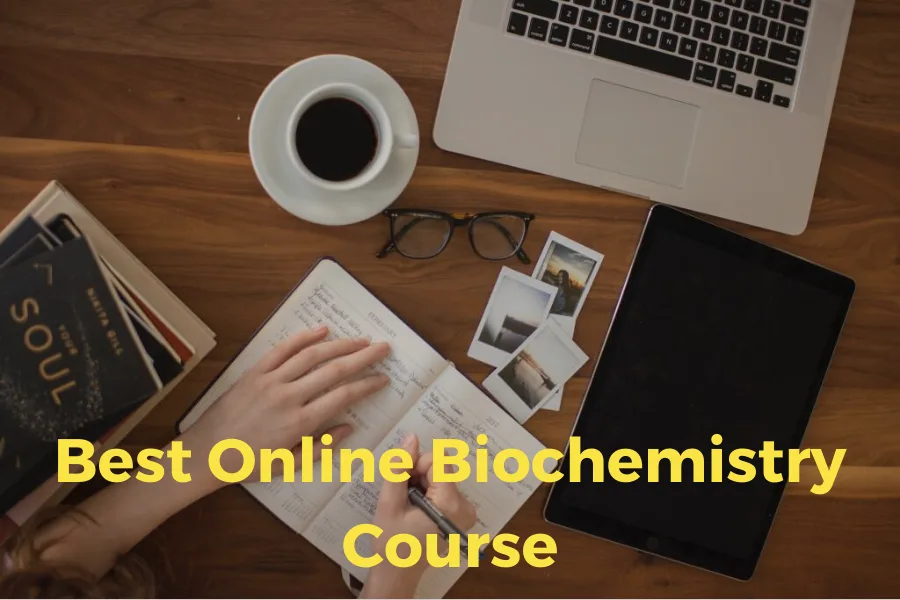- Best EdX Criminology Courses Guide - August 16, 2022
- Best EdX Design Courses That Could Help Jumpstart Your Career - August 16, 2022
- EdX vs Pluralsight - August 16, 2022
If you’re looking for the best online biochemistry course, you’ve come to the right place!
Biochemistry is a fascinating subject, but it may not be a course you’ve considered doing online before – you don’t tend to find a huge amount of science-based courses on popular online learning platforms like Udemy or Skillshare, for instance.
You might associate biochemistry with lab work – which, of course, usually has to be done in person (although virtual labs are becoming more common). However, there are a few great biochemistry online courses out there that gives students a good basic knowledge from home.
If you want to learn more about biochemistry and how chemistry and biology overlap, these courses could be the right choice for you. In this article, we’ll look at whether biochemistry is the best choice for you, as well as an overview of what to look for if you want to sign up to a new course.
There isn’t a huge amount of choice for a biochemistry course online, but we’ve picked four for you to look at today – and we’ll look at the course specifications, an overview of the topics covered, student reviews, and their pros and cons.
First, an overview of the courses we’re looking at today.
Best Online Biochemistry Course – an Overview
- Biochemistry: Biomolecules, Methods, and Mechanisms on EdX – Taught by MIT. Length: 12 weeks
- Principles of Biochemistry on EdX – Taught by HarvardX. Length: 15 weeks
- Biochemistry Free and Easy on iTunes U – Taught by Oregon State University. Length: Variable
- Biochemistry: The Molecules of Life on OpenLearn – Taught by Unversity of East Anglia. Length: 3 weeks
Will an Online Biochemistry Course Suit Me?
Of course, if you’re interested in a biochemistry online course, you probably have a variety of reasons. Biochemistry is a branch of science focusing on the chemical processes and substances within living organisms. That covers a huge range of subtopics, but essentially: biochemistry helps us understand how life works.
If you want to study biochemistry for personal reasons, it’s a good choice – you’ll gain an understanding of how certain processes work, and it may inspire you to look at life a little differently. If you want a change in career, however, studying biochemistry is useful for a range of professions, including:
- Medicine
- Teaching
- Agriculture
- Cosmetics
- Forensic crime research
- Drug development
Studying biochemistry can sharpen your analytical skills, improve your critical thinking, teach you how to interpret data, and improve your problem-solving skills.
An online biochemistry course is going to give you knowledge in the basics of biochemistry – giving you a broad overview of the topic, including the history of ground-breaking developments in biochemistry, as well as more specific skills, including how to use certain types of software and how to interpret data from real-life studies.
At the time of writing, the only college in the US offering an entire online degree in biochemistry is the University of Arizona – and even that requires some hours in a lab on campus. So, if you want to pursue a career in the subject, you’ll have to consider going down the traditional route of getting a degree in the subject with plenty of practical lab experience.
If you’re looking to change careers, or you just want an understanding of the subject, an online course can teach you a lot about biochemistry – so it’s definitely worth considering if you want to know more.
What to Look for in a Biochemistry Course Online
Here are a few things you might want to look out for when choosing a course.
Personal Goals
What do you want to get from an online biochemistry course? Whether you’re pursuing it for career reasons or just for intellectual curiosity, it’s a good idea to figure out what you want to get from it before you start.
This will help you to find the right course for you – some courses are aimed at encouraging students into further study, some are there to give you a basic introduction to the topic, and some are designed to help particular types of students (those looking to go on the pathway to pre-med, for example).
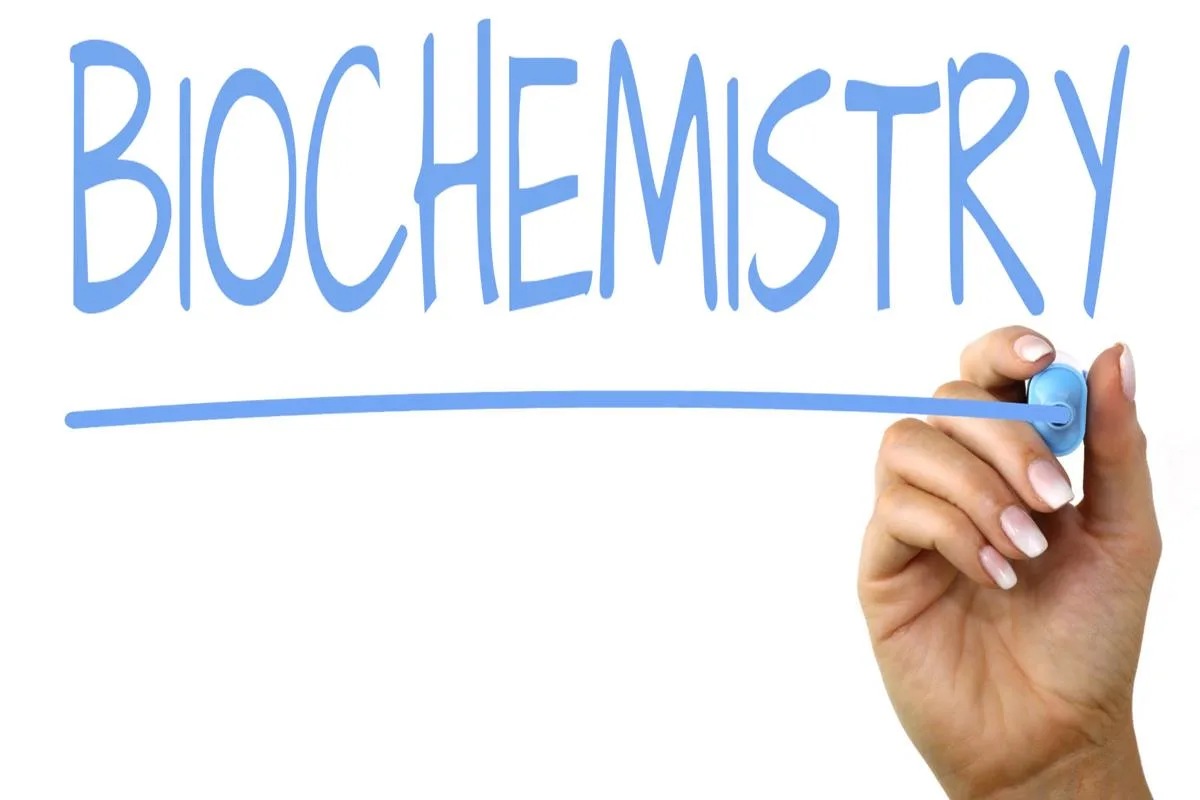
Study Hours/Length of Course
Some courses are more involved than others. Free courses can be anything from 6 weeks through to 12 weeks or beyond, so it’s important to consider how many weeks you want to devote to it.
Most courses will give you an approximate idea of how many hours you may need to study each week. This will give you an idea of how manageable it is and will help you to plan how you intend to fit it into your lifestyle.
Costs
Many of the courses on this list are free, and others require a small fee to get a printed certificate. Certification is great as you can show them to potential employers, but they usually cost around $100-200.
If you want an online course that is going to give you college credits, you’ll be looking at higher fees, but these vary between institutions.
Prerequisites
Some courses require you to have certain qualifications, depending on the level, of course, you’re looking at – they will make this clear in the course description.
Other courses do require you to have a little background knowledge in certain areas. This may or may not be expressed as clearly (which is why looking at course reviews helps).
You may have an advantage if you already have some background knowledge in the subject – that doesn’t mean the course will be inaccessible to you, it just means that you might have to put more hours into it than others might.
Check that the course doesn’t require experience in certain types of software. PyMOL and MATLAB are two common programs that you will encounter in Biochemistry courses, and it might be advantageous to have some familiarity with them beforehand.
Instructors
It’s always a good idea to check out the instructors for your chosen course to make sure they’re qualified – it should state who the instructors are in the course description as well as their qualifications, their specialist subjects, and the institution they come from.
Reviews
Check out the reviews for the course before you commit – and try searching for reviews outside of the learning platform itself. You should find some honest reviews out there, and this will give you a good idea of whether the course will suit you or not.
Support
Free courses don’t tend to offer much in terms of one-to-one support – you’re not going to have access to lengthy chats with professors. However, some courses allow you to connect with other students, which can be really helpful. If you encounter technical problems, the learning platform itself usually has a support center that you can contact.
Content
Most of the courses on this list offer a broad look at the basics of biochemistry. This means you’ll cover topics such as protein structure, membranes, blood clotting, the impact of drugs on pathways, and so on.
You can also expect to be able to practice some basic scientific skills, like creating a hypothesis and interpreting data. However, on a beginner’s course, you won’t be able to go particularly deep on one topic, because there is usually a lot of content to cover.
Online courses are usually made from a mixture of video lectures, supplementary texts, and discussion questions. Some courses offer exams for further certification, but free courses don’t tend to require students to sit exams.
Assessment
Some courses are just a series of lectures and supplementary materials for you to work through in a specified time period. Others are more structured, with assessments in the form of answering questions or even exams in some cases.
Technical Specifications
Depending on the online course platform you’re using, you may require certain technical specifications. Most platforms are designed to be used on mobile devices, too, and don’t usually require you to own the most up-to-date computer out there – just a computer with a decent web browser.
Additional Costs
You may encounter the occasional extra – a recommended textbook, for example, or supplementary materials. Most courses will be upfront about this in the course description, so you can prepare in advance.
Further Study
Most of the courses don’t count towards college credit – they’re designed to give you an idea of the subject before you commit to studying at a higher level. You may find that, towards the end of the course, the professors recommend a certain pathway for further studies.
Biochemistry: Biomolecules, Methods, and Mechanisms – EdX
Institution: MIT
Level: Intermediate
Prerequisites: Undergraduate Introductory Biology
Length: 12 weeks
Hours Required: 3-6 hours per week
Price: Free (or $150 for a Verified Certificate)
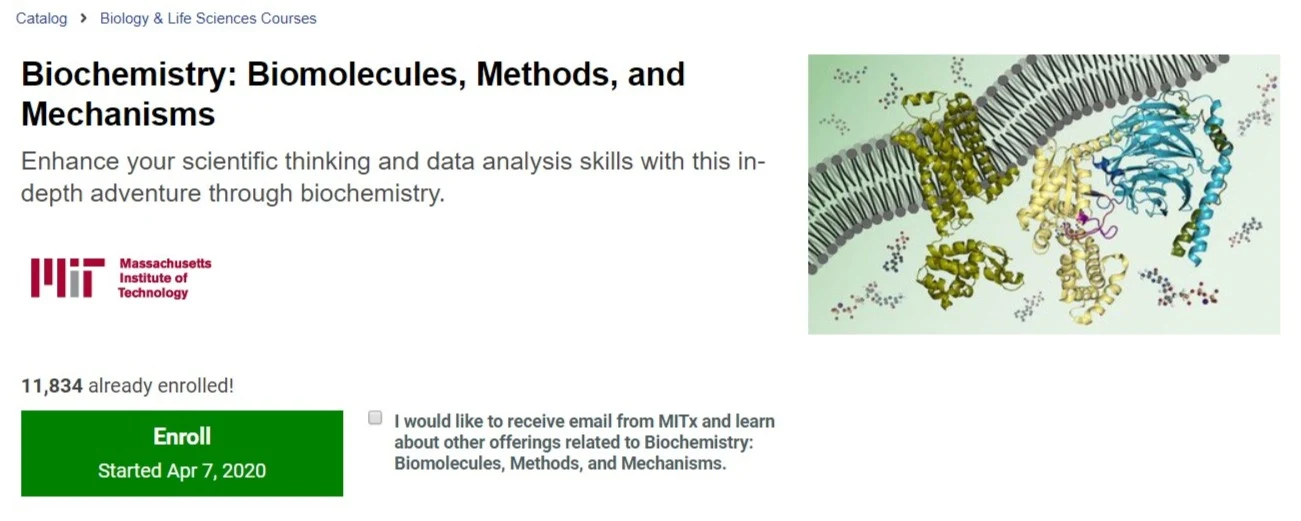
In the Biochemistry: Biomolecules, Methods, and Mechanisms course hosted by EdX, Professor Yaffe – an MIT professor and practicing surgeon – guides students through the basics of biochemistry.
With a focus on developing scientific thinking, the course guides students through articulating hypotheses, interpreting data, and designing different kinds of experiments. They use real data from experiments to break down the scientific process of interpretation, which is useful. So, you can expect the course to cover a range of vital skills for biochemistry.
They use PyMOL – molecular visualization software – to help students to understand the function and mechanism of molecular structures. They also use MATLAB (a programming platform) to explore quantitative aspects of biochemistry.
Students who show exceptional work can apply to take the MITx 7.05x Biochemistry Competency Exam – this is a challenging exam.
Students must complete an undergraduate introductory biology course before they can start this one.
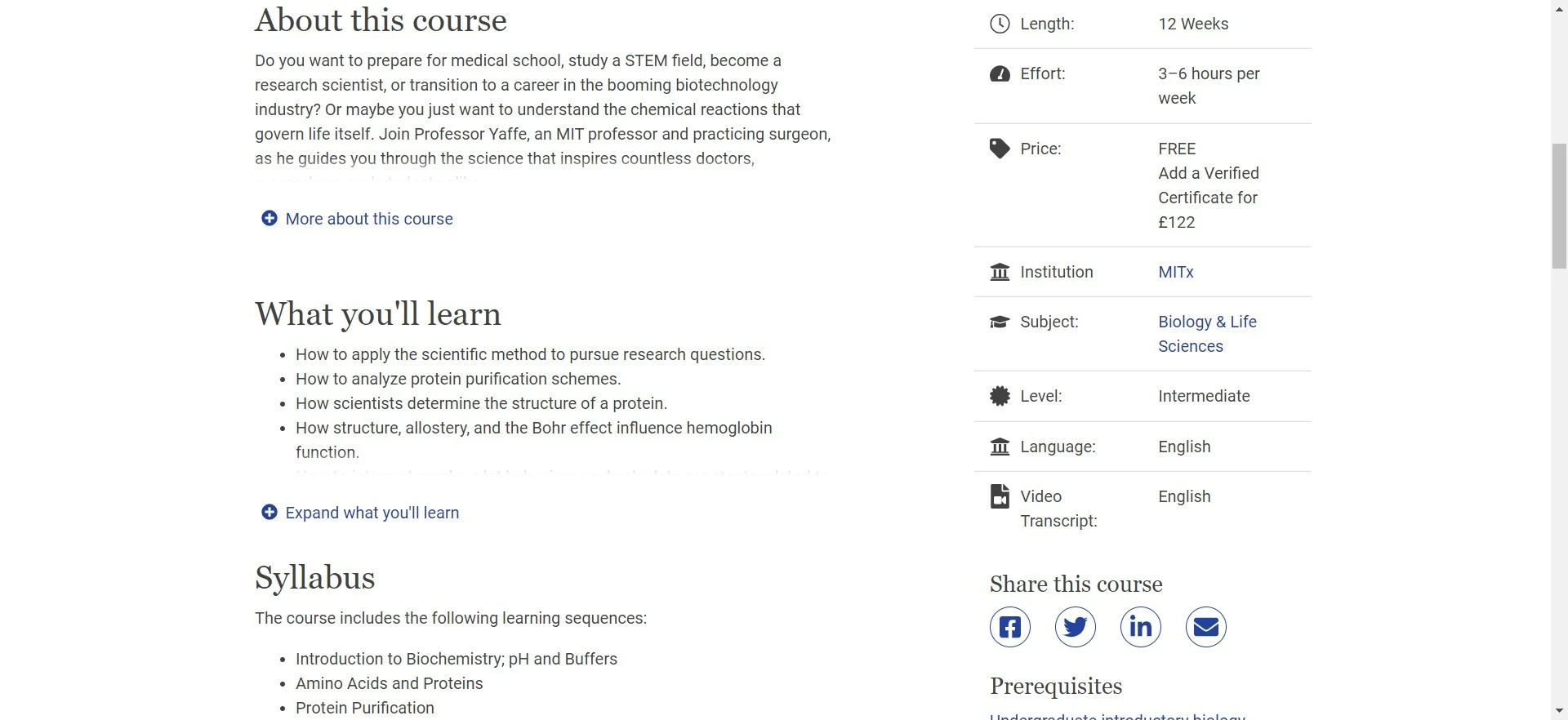
You can find out more about it here.
Learning Goals
- How to apply the scientific method to pursue research questions
- How to analyze protein purification schemes
- How scientists determine the structure of a protein
- How structure, allostery, and the Bohr effect influence hemoglobin function
- How to interpret graphs, plot behaviors, and calculate constants related to enzyme function
- How pumps, transporters, and channels differ from regulating molecule transfer across membranes
- How G proteins play a key role in signaling.
Course Structure
The course is structured into the following sections:
- Introduction to Biochemistry; pH and Buffers
- Amino Acids and Proteins
- Protein Structure
- Protein Folding
- Hemoglobin and Allostery
- Hemoglobin and the Bohr Effect
- Enzyme Chemistry
- Enzyme as Catalysts
- Enzyme Kinetics
- Membranes, Channels, Transporters, and Pumps
- Blood Clotting
- Signal Transduction
Instructors
There are four experienced instructors on this course:
- Michael Yaffe, director of the MIT Center for Precision Cancer Medicine, the David H. Koch Professor in Science, and Professor of Biological Engineering
- Mary Ellen Wiltrout, MITx Digital Learning Scientist in the Department of Biology
- Darcy Gordon, MITx Digital Learning Fellow, Department of Biology
- Monika Avello, MITx Digital Learning Fellow, Department of Biology
Reviewers Say …
Course reviews are generally positive, with students enjoying Yaffe’s fast-paced, highly informative lectures. As with all online courses, how much you’ll get from, it will depend on the level of work you’re willing to do. Some students felt that the supplementary materials weren’t as detailed as they’d like.
If you don’t know MATLAB, this may not be the course for you. Although it doesn’t say that you need previous experience in MATLAB in the course description, they presume you have some experience in it, and that has been a major stumbling block for some students.
Most students felt that they covered the basics of Biochemistry and came away with a good understanding of each topic.
Pros
- Yaffe’s lectures are engaging and packed with information
- Gives a good grounding in introductory topics
- Gives students a chance to practice basic scientific skills
- Allows access to MATLAB and PyMOL
Cons
- Supplementary materials aren’t as detailed as some would like
- If students haven’t used MATLAB before, they may struggle to keep up
Principles of Biochemistry – EdX
Institution: HarvardX
Level: Intermediate
Prerequisites: College-level Introductory Biology, College-level Introductory General Chemistry (including basic Organic Chemistry)
Length: 15 weeks
Hours Required: 4-6 hours per week
Price: Free (or $199 for a Verified Certificate)
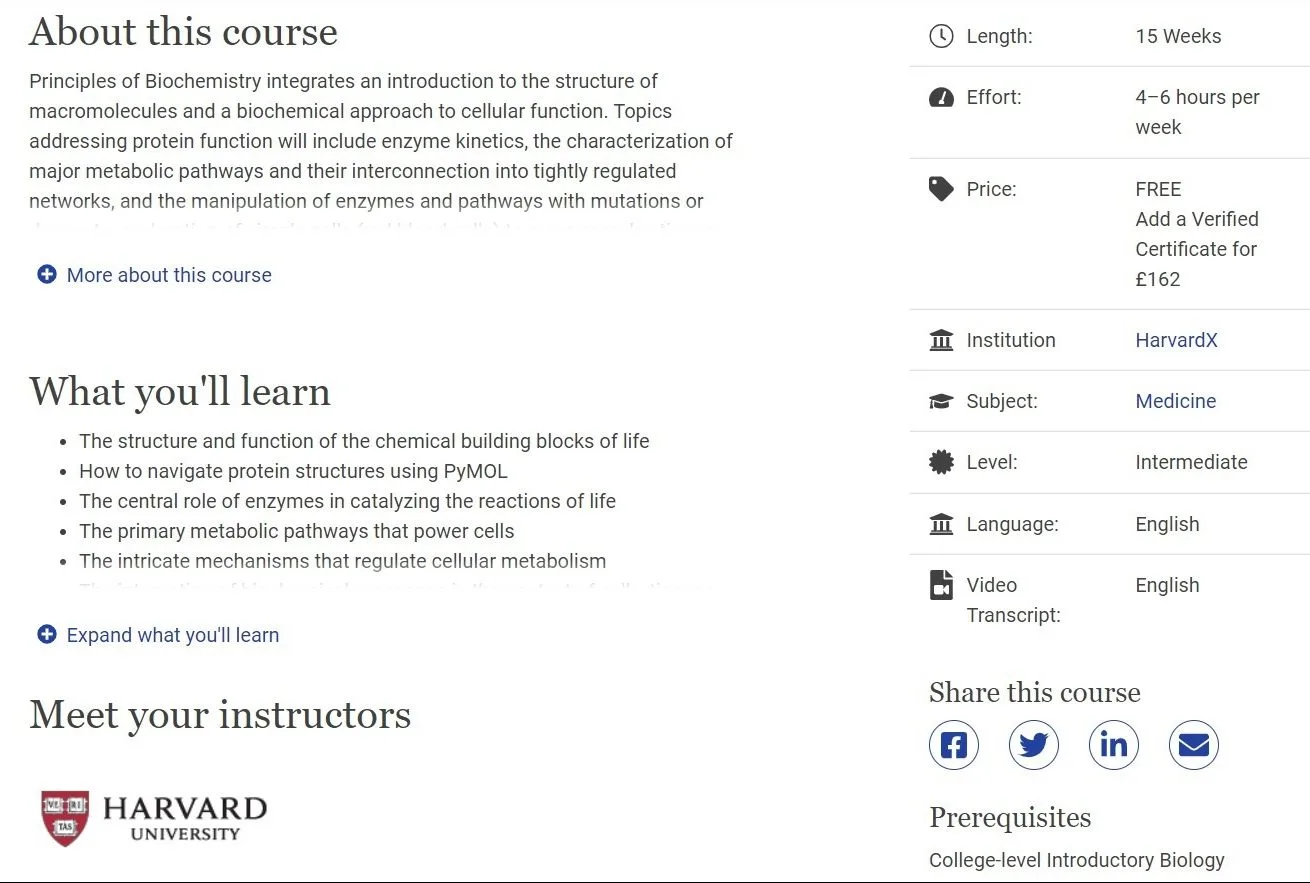
Run by HarvardX, the Principles of Biochemistry course on EdX introduces the structure of macromolecules and a biochemical approach to cellular function. It covers a broad range of topics, including protein function (which includes enzyme kinetics, major metabolic pathways, and the manipulation of enzymes and pathways with mutations or drugs), simple cells, and complex tissues.
Throughout, students will develop their analytical and problem-solving skills, useful for all sciences.

You can choose to pay $199 for a verified edX certificate.
You can find out more about the course here.
Learning Goals
- The structure and function of the chemical building blocks of life
- How to navigate protein structures using PyMOL
- The central role of enzymes in catalyzing the reactions of life
- The primary metabolic pathways that power cells
- The intricate mechanisms that regulate cellular metabolism
- The integration of biochemical processes in the context of cells, tissues, and whole organisms
Instructors
There are two instructors on this course:
- Alain Viel, Senior Lecturer, Department of Molecular and Cellular Biology
- Rachelle Gaudet, Professor of Molecular and Cellular Biology
Reviewers Say …
Reviews are excellent for this course, with students enjoying a good grounding in the basics of biochemistry. They describe the lectures as ‘amazing’ and ‘clear’. Many students describe the course as being of medium difficultly, with a couple suggesting they found it hard (one student used the word ‘grueling’ as it covers such a huge amount of information).
The downside is the presentation isn’t the most modern or sleek-looking, but other than that, students are very positive about their experience on the course – and they were impressed to have free teaching from HarvardX.
Pros
- Covers a huge amount of material
- Gives a good grounding in basic biochemistry
- Lectures are enjoyable
Cons
- Covers a lot of material, so may be tough to keep up with if you have a lot of other commitments
- Not the most modern-looking course
Biochemistry Free and Easy – iTunes U
Institution: Oregon State University
Level: Beginner
Prerequisites: None
Length: Variable
Hours Required: Variable
Price: Free
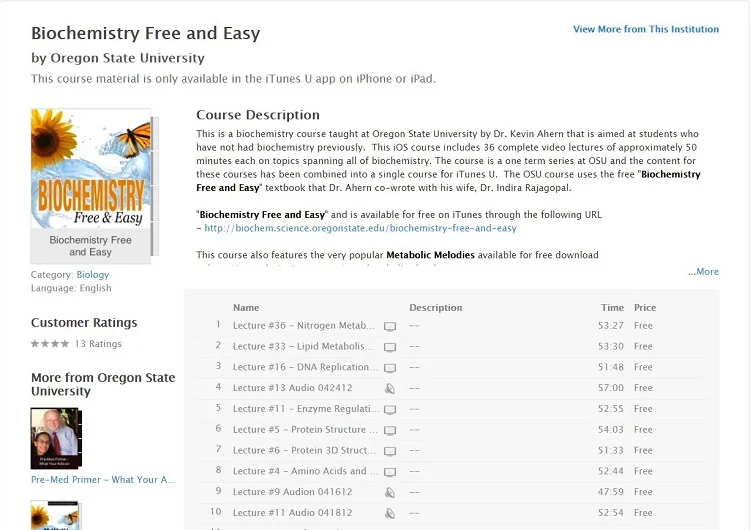
Hosted by iTunes U, the Biochemistry Free and Easy course run by Oregon State University is taught by Dr.Kevin Ahern and is aimed at students who have no previous experience with biochemistry. It’s a little different from the other online courses we’ve looked at so far – in this course, you will receive instant access to 36 video lectures (around 50 minutes each) on a huge variety of topics.
Dr.Ahern and his wife, Dr.Indira Rajagopal, wrote a free textbook named ‘Biochemistry Free and Easy,’ which is available through iTunes or through the Oregon State University website.
A fun bonus of this course is a series of songs, Metabolic Melodies, designed to help students remember information easily.
As this course is structured differently than some of the others on this list, we cannot offer a breakdown of the syllabus or the learning goals. However, it’s a great resource that covers a lot of information if you want a basic grounding in biochemistry.
You don’t need an Apple device to use iTunes U, but the course works really well on an iPad or iPhone.
You can find out more about it here.
Instructors
The instructor for this biochemistry online course is Dr.Kevin Ahern, a friendly, welcoming professor in the Department of Biochemistry and Biophysics at Oregon State University. He has a special interest in developing free materials on biochemistry.
Reviewers Say …
Reviewers feel that the course is engaging, fun, and interesting. They were impressed with the amount of information covered in this completely free resource and felt that the professor broke down complex subjects in an easy-to-understand manner.
Pros
- Free resource
- Comes with free textbook
- Songs available to aid memorization of complex topics
- Covers a wide range of topics
Cons
- Doesn’t offer certification
- Not as well-organised as some of the other courses out there
Biochemistry: The Molecules of Life – OpenLearn
Institution: University of East Anglia
Level: Beginner
Prerequisites: None
Length: 3 weeks
Hours Required: 3 hours a week
Price: Free
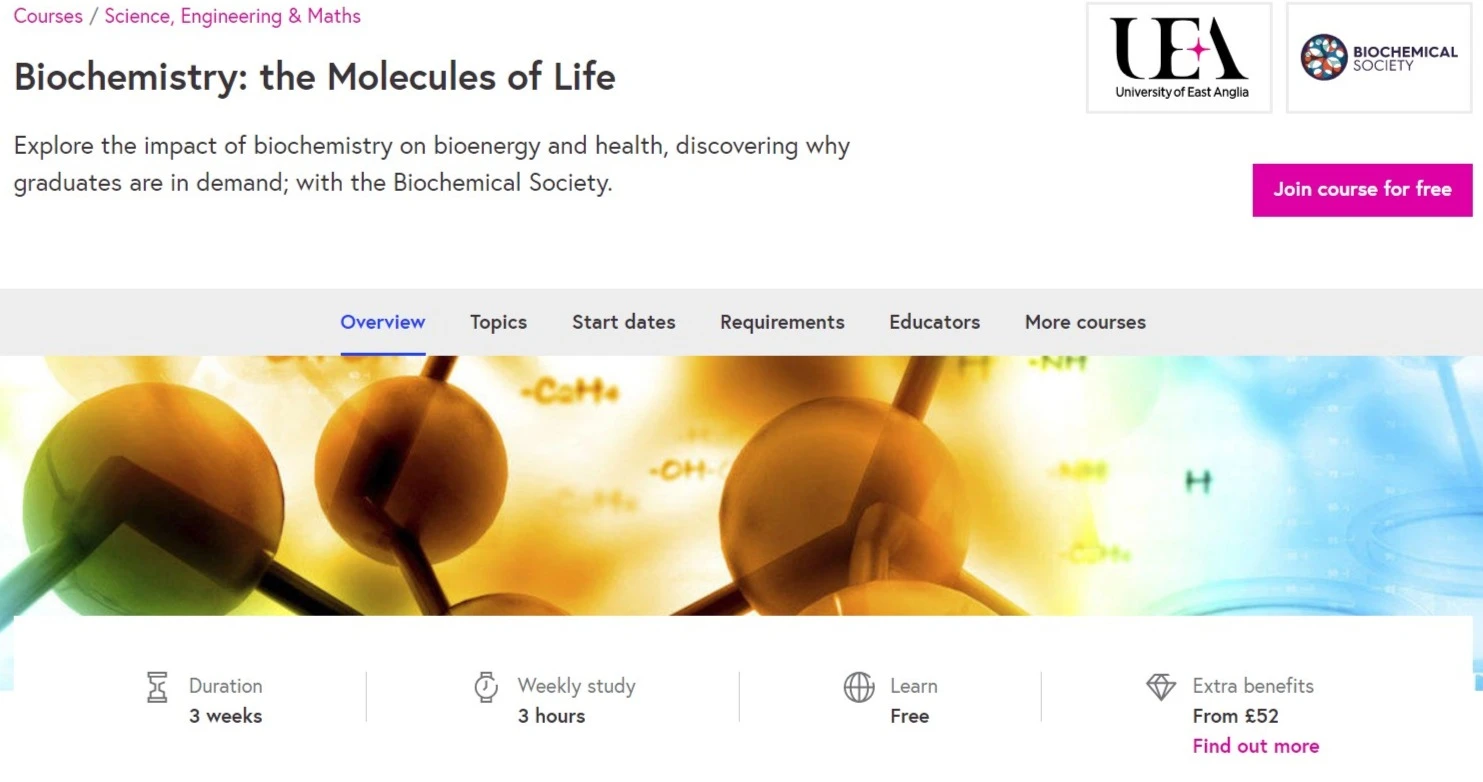
Biochemistry: The Molecules of Life is a simple course from the University of East Anglia, England. Of all the courses on this list, it’s the most ‘shallow’ in terms of content, but it still offers a good grounding in the basics – it’s aimed at 15 to 19 year olds who are already studying biology and chemistry, and it has a focus on career pathways.
Throughout the course, students will hear from various staff members from the University of East Anglia, to see how biochemistry is used in research and hospitals. They will also learn a basic history of the major developments in biochemistry, including significant people and events that have shaped our understanding of certain processes over the years.
It’s not designed to be as in-depth as others on this list (for example, you won’t get to interpret real data or gain any practical experience using software), but it’s great for those considering a change of direction.
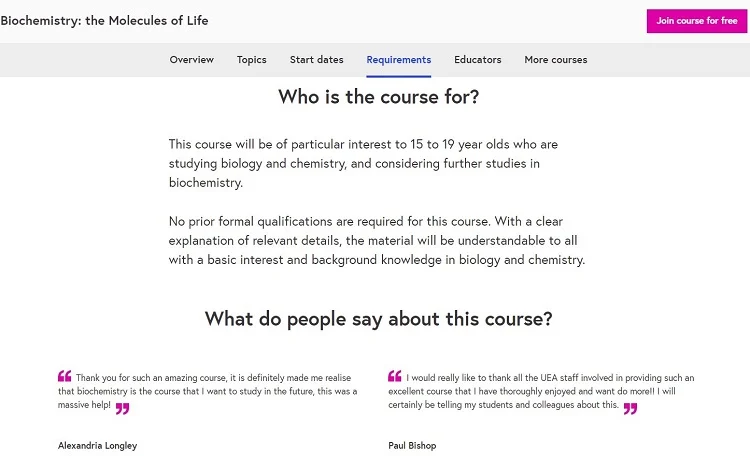
You can find out more about it here.
Learning Goals
By the end of the course, students should be able to:
- Discuss how biochemistry brings together the natural sciences to describe the chemical basis of living systems
- Describe events and scientists of significance in the development of biochemistry
- Identify crossover points between biology and chemistry
- Evaluate where biochemistry will play a key role in scientific advances
- Explore career opportunities
- Summarise seminal experiments that led to advances in biochemical knowledge
Course Structure
The course covers the following topics:
- Skills from biochemistry
- A brief history of biochemistry
- Everyday biochemistry
- Metabolism and bioenergetics
- Bioenergetics
- Future developments in bioenergy
- Natural products and healthy living
- Future developments: new technologies in the molecular sciences
- Getting involved in biochemistry
Instructors
The course is led by two instructors:
- Richard Bowater – reader in the School of Biological Sciences at University of East Anglia
- Fraser MacMillan – biophysical chemist in the School of Chemistry at University of East Anglia
Reviewers Say …
Reviewers enjoy the course, saying it gave them a good idea about a career in biochemistry and what it involves. It’s a beginner-level course, so it doesn’t give you a deep understanding of each topic, but it does give great insights into how biochemistry can be used in real work situations.
Pros
- Great for younger people or those considering a change in career
- Covers basics of the history of biochemistry
Cons
- Not as in-depth as other courses on this list
Frequently Asked Questions
If you’ve still got questions about biochemistry online courses, we may have the answer.
It’s a huge and complex topic, that does require some basic knowledge in biology and chemistry. So yes – it can be difficult, and it’s not for the faint-hearted. It helps if you enjoyed science at school, as that will give you a foundation to work upon.
Some do – but most of them don’t. Most medical schools want to see that you have practical, hands-on experience.
Ideally, an online learning platform should be simple to use and easy to seek support if necessary – click here to read our guide on the best online learning platforms.
That depends. If you’re studying just for the love of learning, you don’t need a certificate and can save yourself $100-200. If you want to show it to a future employer, however, or you want it to look good on your resume, it might be worth investing in a certificate.
Yes – Coursera have a good selection of courses that link to biochemistry. These include DNA Decoded, Fundamentals of Immunology, and The Science of Stem Cells.
Conclusion
While there isn’t a huge range of biochemistry courses available just yet, we expect more to be developed in coming years, as more people choose to study STEM topics online.
If you want to learn about where biochemistry can take you as a career choice, Biochemistry: The Molecules of Life from OpenLearn is a good choice. Although it’s based in the U.K, it does give you a good idea of the different types of careers that require biochemistry. It’s a good way of seeing where an interest in biochemistry can take you.
Biochemistry Free and Easy on iTunesU is a great course if you have a general interest in the subject, and you want to learn more about it in an engaging, memorable way. It’s a great free resource with the accompanying textbook – we think it’s great that they want to make a complex topic accessible for all.
However, if you want a really good look at biochemistry basics, we’d recommend either Biochemistry: Biomolecules, Methods, and Mechanisms (by MIT) or Principles of Biochemistry (by HarvardX). Both courses cover a lot of ground, and they’re taught by experienced, knowledgeable professors from two of the most highly esteemed colleges in the world. Either would be a great choice if you want to go deeper into the topic, especially if you want to gain some experience in using PyMOL and MATLAB.
We hope this has helped you to find the right biochemistry course for you. If you want to find out about different courses, these might help you out:

